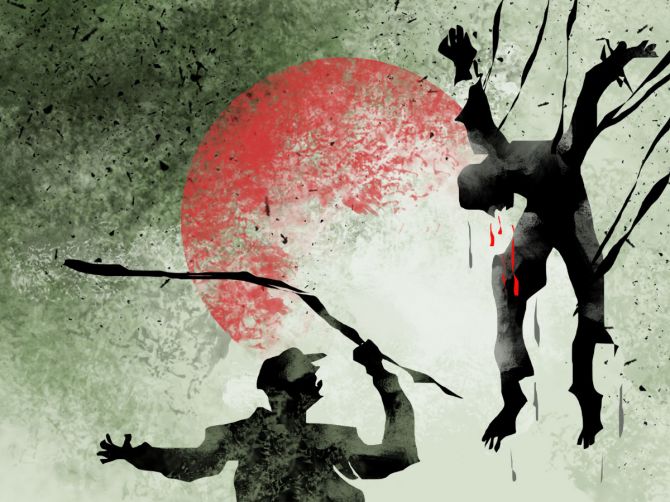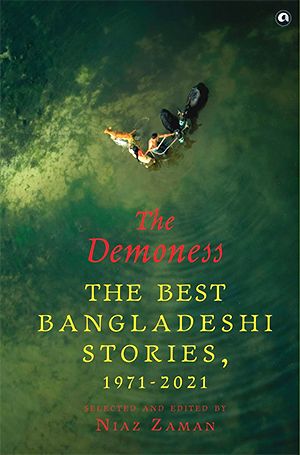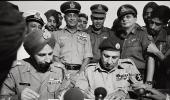Last night someone had blasted a bomb near the college boundary wall.
'Miscreants have blown up the electric transformer.'
'And while retreating, they hurled a grenade at the principal's house.'

The Demoness: The Best Bangladeshi Stories, 1971-2021 has been published to celebrate the golden jubilee of the independence of Bangladesh.
Akhtaruzzaman Elias's The Raincoat describes the effect of the war on a college and on one of its teachers in particular.
The protagonist, whose brother-in-law has joined the guerrilla forces, is called by the principal to the college one day. It is raining and he dons his brother-in-law's military-looking raincoat.
In the bus going to college, several passengers disembark, taking him to be a soldier.
At the college he is interrogated about his connections with the guerrilla forces. In the end, his military-looking raincoat is not enough to save him.
An edited excerpt of the short story follows:
The fine rainy morning, the chilly feel of late Hemanta, the short season between autumn and winter, were completely shattered by the constant banging on the door.
All was spoiled now. The army was right at his door! Oh God, no! Allahumma anta subhanaka inni kuntu minaz zoalemeen, muttering the Quranic verse to ward off danger, he advanced towards the door.
Since the army crackdown, he had had to memorise so many holy verses. Whenever he was in the street, he kept the five kalemas, the five basic Islamic beliefs, ready on his lips. Who knew from which direction the military would show up and catch him?
Yet, you see, how he always made pesky little errors. For example, he had remembered the verse all right, but had forgotten the cap at home.
Two bolts, one hook and a wooden cross-bar -- after pulling down all these, he opened a panel of the door slightly. A gust of wind and rain entered the room, and with them entered the peon of the principal.
Alhamdulilillah! Thank God, it was not the military.
He felt like hugging the peon and kissing him. But the man shouted in his squeaky voice, ‘You have been greeted by our sir.’ Then, as if to compensate for this mild statement, he hollered again, ‘You have been called. Must go now!’
‘What’s the matter?’
He didn’t have time to explain. Last night someone had blasted a bomb near the college boundary wall.
‘What!’
‘Miscreants have blown up the electric transformer. And while retreating, they hurled a grenade at the principal’s house. The gate has been blown up!’
How dangerous! The electric transformer was right beside the front wall. Beyond the wall were the garden and the tennis lawn. Then the college building.
Opposite the huge building was the cricket and football field.
Across the field, on the left, were the principal’s quarters.
The army had put up their camp near it. The college gymnasium had been turned into a military camp. Blasting a bomb at the entrance of the principal’s house meant attacking the army camp itself. How dangerous!
How could they cross all that distance after blowing up the front wall? How come? He wanted to know.
How could the peon of the principal answer? ‘Perhaps you can answer that better,’ said the peon.
What? How could he explain any better? Did this peon think that he had links with the miscreants? His head lowered on its own and these words poured forth, ‘Ishaq Miah, please sit down. Have a cup of tea, eh? It’ll take only a few minutes.’
‘No, no,’ Ishaq refused the invitation to tea and said, ‘I have to go to Abdus Sattar Mirdha’s house. You’d better come right away. A colonel is already there. All the professors have been called. Come quickly...'
Since the army crackdown, everybody in the college had been afraid of him (Ishaq).
He had quit speaking Bangla since April that year. Sometime in the remote past, a distant relation of his had been the valet of some sahib from Delhi. By virtue of that connection, he had now started speaking Urdu all the time.
The principal, a thickset man, also started to practise the new tongue with painstaking effort with his peon. He would say, ‘Ishaq Miah, there’s a lot of trouble in the country. Tell the professors to be very careful. Tell them not to indulge in rumours. It’s essential for us to serve the army now.’...
‘Honey, the umbrella alone won’t be enough in this heavy shower,’ his wife’s coaxing voice could be heard again. ‘You’d better take Mintu’s raincoat.’
See, Mintu, again! He had to worry even more about this brother-in-law of his. From his house, oh, yes, from his two-bed flat at Maghbazaar, Mintu had disappeared on June 23. He had planned to move out on July 1. Who knew what the neighbours had guessed...
Both he and his wife knew where Mintu had gone. Again, see what Asma had told his children to establish the heroism of her brother. Even the children often said, ‘Our younger uncle has gone to kill the Khan soldiers.’
Who could tell what danger would come from what utterance? Now, if Asma was so courageous, why didn’t she accompany her brother? Of course he could not say these words, but his tongue almost itched to utter them.
Forget Mintu, Asma, forget your brother. Nobody is with us, nobody. Mr. Kissinger had said these were the internal affairs of Pakistan. They killed people randomly, and burnt down houses, villages, bazaars, everything. Nobody seemed to have a headache about it. These were all internal affairs.
Oh, no! What was he doing? These thoughts should never be allowed to enter his mind.
The owner of a welding shop lived in the flat downstairs. His father must be a leading razakar. Every two or three days he could be seen transporting refrigerators, tape recorders, expensive sofa sets, fans, bedsteads, all types of furniture. Once even the icon of a Hindu god was seen among the booty. Who could tell if it was made of gold or no?
Booty was brought there in loaded trucks, then unloaded and loaded on trucks and carried away. Where did the razakar get these from?
If the man only knew that the brother-in-law of the professor was a miscreant who had left home vowing to kill every soldier he could, then surely shots would be heard in this house, right in this room.
Asma would be lulled into eternal sleep by the music of gunshots. So it was necessary to be cautious when talking...
‘Abbu looks like our young uncle now. Abbu is like our uncle now.’ He shuddered to hear this chant of his just awakened daughter.
What, had Mintu entered the house fully armed? That meant the army had also entered chasing after him. That again meant -- No, how could that be? The door was tightly locked and bolted.
His two-and-a-half-year-old daughter sat on the bed clapping her hands and saying, ‘Abbu has become our little uncle. Ho, ho, Abbu has become our uncle.’
Did he really look like Mintu? Would the military mistake him for Mintu?
Meanwhile, his five-year-old son observed him gravely and pronounced, ‘Yes, Abbu looks exactly like our younger uncle. Abbu has become a freedom fighter now, has he not?’
This was indeed a matter of concern. He stood in front of the dressing table and was confounded to see his new guise.
The colour of the raincoat was not fully khaki, nor was it olive. The original brown colour had faded a bit, but the gloss had not gone. He looked somewhat like a military man.
But it was not safe to look like a military man. If the raincoat were taken to be military guise, the army would catch him and send him straight to the cantonment.
Oh, no, he was being silly. Why should it be an offence to put on a raincoat on a rainy day? Didn’t the military have any sense at all?...
In the principal’s chamber a panda-like army officer was sitting in the throne-like chair of the principal. From his grave face one could guess that the panda was either a colonel or a major general, or a major, or maybe a brigadier.
When the principal saw him, his black face turned purple. Trying to maintain the dignity of his degrees -- M Sc, PhD, EPSE -- the principal said, ‘This is Professor Nurul Huda.’
But Dr Afaz Ahmed, MSc, PhD could not stop himself from promptly saying, ‘Sorry, he’s not a professor, but a lecturer in chemistry.’
‘Shut up,’ shouted the panda.
The principal fell silent.

Before marching Nurul Huda and Abdus Sattar Mridha to the jeep, the huge colonel or brigadier, or whatever, cautioned the principal sternly and said that it was a great offence to make verses in mockery of the armed forces. He had been spared this time, but from now on he would be kept under close vigilance, the officer said.
The principal made references to the Urdu professor, Akbar Sajid, but this did not help much.
Nurul Huda was worried for Sajid -- if he had not already fled, only God and this military officer knew what there was in store for him.
Both he and Mridha were blindfolded. The jeep turned several corners. Finally, the jeep stopped and they were led into a big room with a high ceiling.
When his fold was removed, he could not see Sattar Mridha.
The place was completely unfamiliar. He sat on a deckchair, but for how long he himself did not know.
A soldier appeared and occupied the seat in front of him. He asked him several questions in English. He answered them all.
When the man left, he was taken to another room where another stranger came and asked him a few more questions. He answered him, too.
The questions were more or less of the same nature, and his answers were the same, too. For example, a few days ago some steel almirahs had been bought for the college.
Who had carried them inside? Yes, three for the office, two for each of the departments of botany, history and geography, and one for English -- thus a total of 10 almirahs were brought into the college.
He did not have to give the details. The almirahs were carried on push-carts. He knew the pushcart men quite well, didn’t he? asked the soldier.
Nurul Huda replied, how could he know them? They were coolies and he a lecturer. Then why had he been talking with them so much?
Yes, at the order of the principal, he had examined the thickness of the steel, the number and shape of the drawers, the quality of the lock and the colour. After all, he had a responsibility....
The military officer said calmly, as if he were giving him a piece of information, that miscreants had entered the college in the guise of coolies. Who other than he knew it better?
When they were caught today, they gave the name of Nurul Huda. He had maintained regular contact with them and he was an activist of the gang.
‘My name? Really? They gave my name?’ The officer heard his excited voice, but was not annoyed. Instead, he seemed to grow excited. Excitedly, the officer said again, Yes, the coolies were all miscreants in disguise. Among the college teachers, they gave only the name of Nurul Huda.
Nurul Huda gazed at him with wonder. Did they know him?
One of the coolies had been standing right at his side when they were arranging the almirahs in the chemistry department. It had been deep monsoon then. Dhaka had experienced a lot of rainfall that year.
He remembered saying something about the torrential rain. At that the coolie had murmured these words, ‘It’s easier in the monsoon.’
He had uttered this twice. Easier? What had he meant? A few days back somebody in the lounge had whispered once or twice, ‘Those bastards did not know the rain in Bengal. There was General Winter in Russia, we have General Monsoon here.’
Didn’t that boy disguised as a coolie mean the same? Had he trusted him so much that he uttered the words in front of him?
With renewed zeal, Nurul Huda looked here and there. The army officer became confirmed of his involvement a little more.
After a while, he did not know how long, but after quite a while the officer asked him the same question, and when he did not get a reply, he hit him hard twice in the face. He slumped over after the first hit and, after the second, fell flat on the floor.
Picking him up from the floor, the officer insisted again that he admit the fact that he knew the hideout of those miscreants very well. He replied, ‘Yes!’
He would be released with honour if he disclosed their hideout, the soldier assured him. Then he was given bread and milk to eat. The officer gave him a chance to think once more and left.
After some time, he did not know after how long, the officer returned and said he knew the hideout of the miscreants, didn’t he? Nurul Huda gave the same answer, ‘Yes.’
When there was no answer to the next question, the officer took him to another room. His thin body was strung up with a rope fixed to the ceiling. He was flogged.
But he soon found the lashes falling on his back just as bothersome as the raindrops falling on Mintu’s raincoat. They had long removed the coat, though. Who knew where they had kept it? But the warmth of the coat lingered in his body.
The lashes fell like drops of rain on his raincoat-skin, and he kept murmuring, yes, he knew their hideout, not only his brother-in-law’s (there was no pride in knowing the address of one’s own brother-in-law), but the hideout of the disguised coolies.
They in turn knew him too and trusted him well. At the mention of his close alliance with the coolies, the dangling body of Nurul Huda shivered so violently that he did not really get a chance to mind the lashes of the whip.
This edited excerpt from The Demoness: The Best Bangladeshi Stories, 1971-2021, selected and edited by Niaz Zaman, been used with the kind permission of the publishers, Aleph Book Company.










